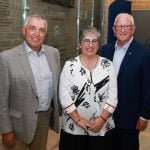Persistent concerns about who is buying Saskatchewan farmland have pushed the province to act.
Agriculture minister Lyle Stewart said the province has hired a special investigator to study recent and future large land deals and trace the flow of money.
“There are lots of rumours about it,” Stewart told the Agricultural Producers Association of Saskatchewan’s annual meeting. “As far as we know, all of these people are Canadians and they’re welcome.”
Canadian citizens, corporations that aren’t publicly traded and permanent residents are allowed to buy as much farmland as they want.
Read Also

First annual Ag in Motion Junior Cattle Show kicks off with a bang
Ag in Motion 2025 had its first annual junior cattle show on July 15. The show hosted more than 20…
However, non-residents and foreign corporations are limited to 10 acres.
Exemptions are often made for companies to establish operations such as potash mines. The Saskatchewan Farmland Security Board can also grant an exemption to allow people time to establish residence.
However, residents have begun to ask who their neighbours really are as investor-owned farms become more common.
“Does the government have a finger on the pulse of who is becoming land owners?” APAS delegate Terry Hildebrandt asked Stewart. “We don’t really know where the money is coming from.”
Some say farmland is selling far above what it would have a couple of years ago. It’s good for sellers but not so good for local buyers who say they can’t compete with deep investor pockets.
In particular, Chinese-Canadian investors have bought large tracts, including 27 quarters south of Regina, leading to speculation that the money is really coming from out of the country.
Stewart said complaints are already investigated, but the board’s capacity to do so is limited.
“So far it hasn’t been found that any of them have been funded by off-shore money,” he said.
The flow of money is important because it could reveal true ownership.

















